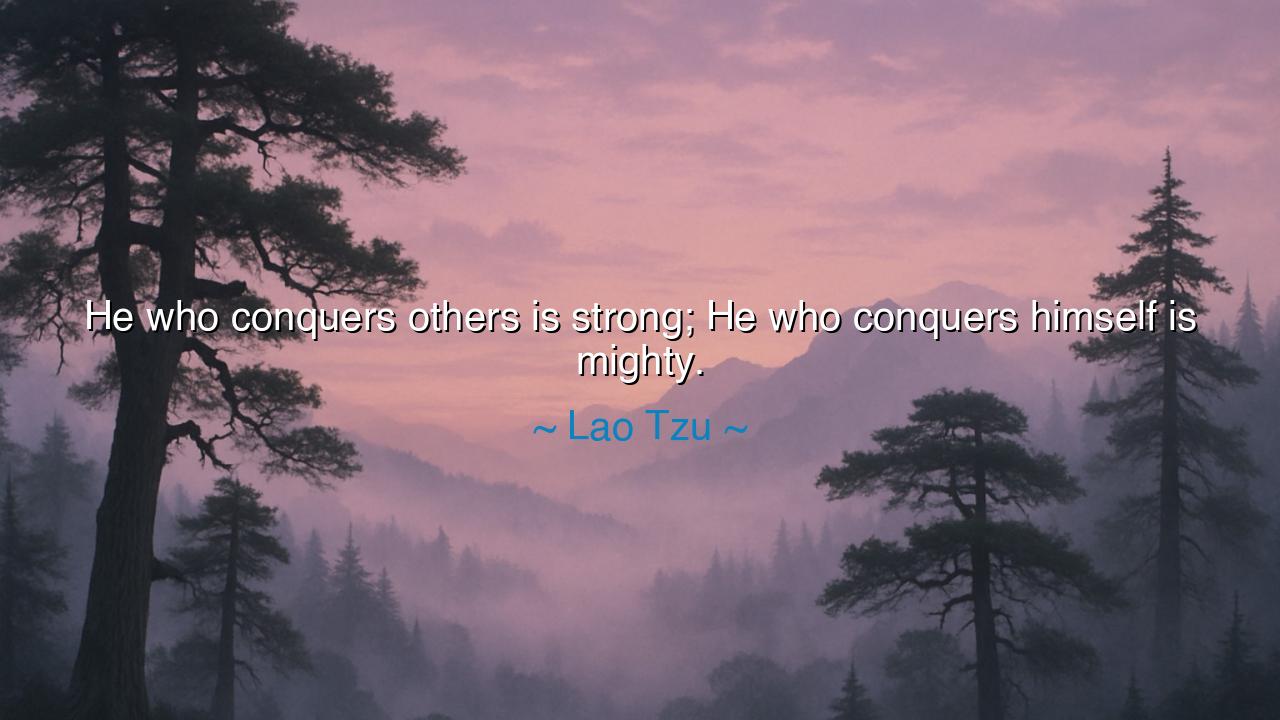
He who conquers others is strong; He who conquers himself is






“He who conquers others is strong; He who conquers himself is mighty.” So teaches Lao Tzu, the ancient sage of the Tao, whose wisdom has flowed through centuries like a river carving valleys through stone. In this brief yet eternal saying, he distinguishes between two forms of strength: the outward power that subdues enemies, and the inward mastery that subdues the restless self. To rule over armies may earn the world’s applause, but to rule over one’s own passions, fears, and desires is to attain a might that no external force can shake.
The ancients knew that the battlefield of the self is fiercer than any clash of swords. The warrior who overcomes nations may still be enslaved by anger, lust, or pride. His victories will be hollow, his throne unstable, for the tyrant who cannot master himself is destined to be conquered by his own excesses. But the one who conquers the storm within—the impulse to hate, the thirst for vengeance, the hunger for vanity—such a man becomes unassailable, for his enemy is himself, and he has triumphed where the fiercest struggle lies.
Consider the tale of Alexander the Great, who subdued vast empires and spread his rule from Greece to India. The world called him strong, for no army could resist his might. Yet within, he was not master of himself. Anger overcame him; pride blinded him; drunken rage led him to strike down his own friend Cleitus. His empire crumbled after his death, for though he conquered others, he failed to conquer his own spirit. Contrast him with Marcus Aurelius, the philosopher-emperor, who fought not only barbarians at Rome’s borders but also waged daily war within himself, recording in his Meditations the discipline of humility, patience, and mercy. Though his victories on the battlefield were modest, his conquest of the self made him mighty in wisdom and enduring in legacy.
This is the heart of Lao Tzu’s teaching: outward strength is loud, but inward might is eternal. The conqueror of others is celebrated for a season, but the conqueror of the self becomes a guide for generations. To tame the tongue when anger burns, to choose compassion when hatred tempts, to persist in discipline when weakness calls—these are victories greater than the fall of cities. For empires rise and fall, but the soul that is mastered remains firm against all storms.
O children of tomorrow, know this: your greatest enemy is not the stranger across the field, nor the rival at your gate. Your greatest enemy looks back at you from the still water’s reflection. Do not waste your life in endless battles against others while neglecting the war within. For if you win all the world but lose the governance of your spirit, your crown is made of dust. But if you rule yourself—your anger, your fear, your pride—then even in poverty or obscurity, you are greater than kings.
The lesson is plain: conquer yourself first. Watch your thoughts, discipline your desires, master your impulses. Practically, let each person do this: begin each day by naming the weakness you will face—anger, impatience, envy, fear. Resolve to meet it as a warrior meets his foe. When you fall, rise again, for mastery is forged not in a single victory, but in daily discipline. In this way, you train your soul as an athlete trains his body, until your inner kingdom is secure and unshakable.
Thus remember Lao Tzu’s eternal words: “He who conquers others is strong; He who conquers himself is mighty.” Let them guide you as a torch in the night. Seek not only to win in the eyes of men, but to triumph in the silence of your own heart. For the one who rules himself has discovered a power no sword can cut, no storm can break, no enemy can overthrow. This is the might of the eternal soul.






AAdministratorAdministrator
Welcome, honored guests. Please leave a comment, we will respond soon